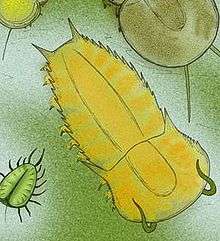Nektaspida
Nektaspida (also called Naraoiida, Nectaspia and Nectaspida) is an extinct order of soft-bodied arthropods proposed by Raymond in 1920; its taxonomic status is uncertain. Specimens are known from the early Cambrian to the upper Silurian periods. A Russian find in de Vendian of the White Sea (=Ediacaran) has in 2006 also been attributed to this order, which would make it the earliest antropod found yet[1]. Whittington (1985) placed the order in the Trilobita. Cotton & Braddy (2000) place it in a new "Trilobite clade" containing the Trilobita, recognizing the close affinities of the nektaspids to trilobites. However this necessitates the inclusion of genera that look very little like trilobites.[2] , it was formerly placed in the stem-group to the chelicerata subdivision of the Arthropoda phylum.[3] However, it currently considered part of Artiopoda.
| Nektaspida | |
|---|---|
 | |
| Naraoia spinosa | |
| Scientific classification | |
| Kingdom: | Animalia |
| Phylum: | Arthropoda |
| (unranked): | †Artiopoda |
| Order: | †Nektaspida Raymond, 1920 |
| Families | |
Naming history
The order was originally proposed by Raymond in 1920 as Nectaspia. Størmer corrected it to Nectaspida for the 1959 Treatise on Invertebrate Paleontology to conform with the names of the other trilobite orders. Whittington described it in 1985 with the spelling Nektaspida; the revised 1997 Treatise by Raymond and Fortey uses this spelling, as do other modern works.[2]
References
- Ivantsov, A. "New find of Cambrian type Anthropoda of the Vendian of the White Sea, Russia" (PDF).
- Budd, G. E. (1999). "A nektaspid arthropod from the Early Cambrian Sirius Passet fauna, with a description of retrodeformation based on functional morphology". Palaeontology. 42: 99. doi:10.1111/1475-4983.00064.
- Budd, G. E.; Jensen, S. (2000). "A critical reappraisal of the fossil record of the bilaterian phyla". Biological Reviews of the Cambridge Philosophical Society. 75 (2): 253–95. doi:10.1111/j.1469-185X.1999.tb00046.x. PMID 10881389.
External links
- Are Naraoids trilobites?—photographs of specimens and discussion of classification controversy.
- Order Nectaspida—more technical overview with references and descriptions of known genera.
